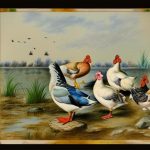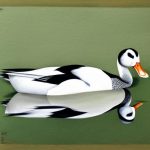The Nova Scotia Duck Tolling Retriever, also known as the Toller, is a medium-sized breed that originated in the early 19th century in the Little River District of Yarmouth County, Nova Scotia, Canada. The breed was developed to toll, lure, and retrieve waterfowl. The Toller’s distinctive hunting style involves playing and frolicking along the shoreline to attract the curiosity of ducks, then retrieving them once they are within range. This unique technique earned the breed the nickname “the little red decoy dog.”
The Toller is believed to be a mix of various breeds, including the Chesapeake Bay Retriever, Cocker Spaniel, and possibly some farm collie or Irish Setter. The breed’s exact origins are somewhat mysterious, but it is widely accepted that they were developed by hunters in the region to assist with duck hunting. The breed was officially recognized by the Canadian Kennel Club in 1945 and by the American Kennel Club in 2003. Today, Tollers are not only skilled hunters but also beloved family pets and versatile working dogs, excelling in various dog sports such as agility, obedience, and flyball.
The Toller’s history is deeply rooted in its Canadian heritage, and the breed’s unique hunting abilities and charming personality have made it a popular choice for dog enthusiasts around the world.
Table of Contents
- 1 Choosing a Reputable Breeder in Canada
- 2 Health and Genetic Considerations for the Nova Scotia Duck Tolling Retriever
- 3 The Importance of Socialization and Training for Your Toller
- 4 Finding the Right Fit: Matching Your Lifestyle with a Toller
- 5 The Responsibilities of Toller Ownership
- 6 Resources for Connecting with Toller Breeders in Canada
- 7 FAQs
- 7.1 What is a Nova Scotia Duck Tolling Retriever?
- 7.2 What should I look for in a Nova Scotia Duck Tolling Retriever breeder in Canada?
- 7.3 What health considerations should I be aware of when getting a Nova Scotia Duck Tolling Retriever from a breeder in Canada?
- 7.4 How can I ensure that a Nova Scotia Duck Tolling Retriever breeder in Canada is reputable?
- 7.5 What should I expect when purchasing a Nova Scotia Duck Tolling Retriever from a breeder in Canada?
Key Takeaways
- The Nova Scotia Duck Tolling Retriever was developed in the early 19th century in Nova Scotia, Canada, for hunting and retrieving waterfowl.
- When choosing a reputable breeder in Canada, it is important to look for breeders who prioritize health testing, socialization, and proper care for their dogs.
- Health and genetic considerations for the Nova Scotia Duck Tolling Retriever include potential issues such as hip dysplasia, progressive retinal atrophy, and autoimmune thyroiditis.
- Socialization and training are crucial for Toller ownership, as they are intelligent and energetic dogs that require mental and physical stimulation.
- It is important to match your lifestyle with a Toller, as they are active and require plenty of exercise and mental stimulation.
- Toller ownership comes with responsibilities such as providing proper care, training, exercise, and socialization for the dog.
- Resources for connecting with Toller breeders in Canada include breed clubs, online directories, and referrals from other Toller owners.
Choosing a Reputable Breeder in Canada
When looking for a Nova Scotia Duck Tolling Retriever breeder in Canada, it is crucial to do thorough research to ensure that you are working with a reputable and responsible breeder. A reputable breeder will prioritize the health and well-being of their dogs and will be committed to preserving and improving the breed. One way to find a reputable breeder is to contact the Nova Scotia Duck Tolling Retriever Club of Canada (NSDTRC) or the Canadian Kennel Club for a list of registered breeders.
It is essential to visit the breeder’s facility in person to see how the dogs are raised and cared for. A responsible breeder will provide a clean and safe environment for their dogs, with ample space for exercise and socialization. They will also be knowledgeable about the breed’s health and genetic considerations and will conduct health screenings on their breeding dogs to ensure that they are free from hereditary diseases. Additionally, a reputable breeder will be transparent about the breed’s temperament, exercise needs, and grooming requirements, and will be available to provide guidance and support throughout the dog’s life.
Before committing to a Toller puppy, ask the breeder for references from previous puppy buyers and inquire about the health guarantee and after-sales support they provide. A reputable breeder will be dedicated to producing healthy, well-socialized puppies and will be committed to finding the best possible homes for their dogs.
Health and Genetic Considerations for the Nova Scotia Duck Tolling Retriever
The Nova Scotia Duck Tolling Retriever is generally a healthy breed, but like all dogs, they are prone to certain genetic health conditions that potential owners should be aware of. Responsible breeders will conduct health screenings on their breeding dogs to minimize the risk of passing on hereditary diseases to their offspring. Some of the health considerations for Tollers include hip dysplasia, progressive retinal atrophy (PRA), and autoimmune thyroiditis.
Hip dysplasia is a common orthopedic condition in dogs that can cause pain and mobility issues. Responsible breeders will have their breeding dogs evaluated by the Orthopedic Foundation for Animals (OFA) or the PennHIP to assess their hip health. Progressive retinal atrophy is an inherited eye disease that can lead to vision loss and blindness. Breeders should have their dogs’ eyes examined by a veterinary ophthalmologist and obtain certification from the Canine Eye Registration Foundation (CERF) or the OFA.
Autoimmune thyroiditis is a condition that affects the thyroid gland and can lead to hormonal imbalances and other health issues. Responsible breeders will have their dogs tested for thyroid function and will be transparent about the prevalence of this condition in their breeding lines. By working with a reputable breeder who prioritizes health screenings and genetic testing, potential Toller owners can minimize the risk of inheriting these health conditions in their puppy.
It is also important for Toller owners to provide regular veterinary care, a balanced diet, regular exercise, and mental stimulation to ensure their dog’s overall health and well-being.
Socialization and training are crucial aspects of raising a well-behaved and well-adjusted Nova Scotia Duck Tolling Retriever. Early socialization helps puppies develop confidence, resilience, and good manners, while training provides mental stimulation and strengthens the bond between the dog and their owner. Tollers are intelligent, energetic, and eager to please, making them highly trainable and adaptable to various activities.
Socialization should begin as early as possible and expose the puppy to different people, animals, environments, sounds, and stimuli. Positive experiences during this critical developmental period can help prevent fearfulness, anxiety, and aggression later in life. Puppy classes, obedience training, and regular outings to new places can help puppies learn how to interact with others appropriately and build their confidence.
Training should be based on positive reinforcement techniques such as praise, treats, toys, and play. Tollers respond well to reward-based training methods and enjoy learning new tricks and commands. Basic obedience training should include commands such as sit, stay, come, down, and walking on a loose leash. As intelligent working dogs, Tollers also excel in dog sports such as agility, flyball, rally obedience, and retrieving games.
Consistent training and socialization throughout the Toller’s life will help them become well-mannered companions and good canine citizens. It is important for Toller owners to invest time and effort into training and socialization to help their dog reach their full potential as a well-behaved and well-adjusted member of the family.
Finding the Right Fit: Matching Your Lifestyle with a Toller
Before bringing a Nova Scotia Duck Tolling Retriever into your home, it is important to consider whether the breed is a good fit for your lifestyle. Tollers are active, intelligent, and energetic dogs that require plenty of physical exercise, mental stimulation, and companionship. They thrive in homes where they can participate in various activities such as hiking, running, swimming, retrieving games, and dog sports.
Tollers are not well-suited for apartment living or sedentary households as they can become bored, anxious, or destructive without enough physical activity and mental stimulation. They are best suited for active individuals or families who enjoy spending time outdoors and engaging in activities that challenge their physical and mental abilities. Additionally, Tollers are known for their strong retrieving instinct and may exhibit behaviors such as chasing wildlife or retrieving objects if not given an appropriate outlet for their energy.
Potential Toller owners should also consider the breed’s grooming needs, as they have a dense double coat that requires regular brushing to prevent matting and shedding. Additionally, Tollers are known for their “tolling” behavior when hunting or playing near water, which may not be suitable for households with small children or other pets that are not comfortable with this behavior.
By carefully considering your lifestyle, activity level, living situation, and preferences, you can determine whether a Nova Scotia Duck Tolling Retriever is the right fit for you. It is important to provide a Toller with ample opportunities for physical exercise, mental stimulation, socialization, training, and companionship to ensure they lead a happy and fulfilling life.
The Responsibilities of Toller Ownership

Owning a Nova Scotia Duck Tolling Retriever comes with various responsibilities that potential owners should be prepared for. Tollers require regular exercise to maintain their physical health and mental well-being. Daily walks, playtime, retrieving games, swimming, hiking, or participating in dog sports are essential for keeping them physically fit and mentally stimulated.
In addition to exercise, Tollers need mental stimulation to prevent boredom and destructive behaviors. Puzzle toys, interactive games, obedience training, agility courses, or scent work can provide mental challenges that keep them engaged and satisfied. As intelligent working dogs with a strong retrieving instinct, Tollers thrive when given tasks that utilize their natural abilities.
Grooming is another important aspect of Toller ownership. Their dense double coat requires regular brushing to remove loose hair and prevent matting. Additionally, they may need occasional baths to keep their coat clean and free from dirt or debris. Regular grooming sessions also provide an opportunity to check for any signs of skin issues or ear infections.
Tollers are social dogs that thrive on companionship and interaction with their family members. They do best in homes where they are included in daily activities and given plenty of attention and affection. Leaving a Toller alone for long periods can lead to separation anxiety or destructive behaviors.
Finally, responsible Toller ownership includes providing regular veterinary care, a balanced diet, preventive healthcare such as vaccinations and parasite control, training and socialization opportunities, as well as ensuring their safety in various environments.
By understanding the responsibilities of Toller ownership and being prepared to meet their needs throughout their life, potential owners can provide a loving and fulfilling home for this unique breed.
Resources for Connecting with Toller Breeders in Canada
For individuals interested in connecting with Nova Scotia Duck Tolling Retriever breeders in Canada, there are several resources available to help facilitate this process. The Nova Scotia Duck Tolling Retriever Club of Canada (NSDTRC) is an excellent starting point for finding reputable breeders who adhere to the club’s code of ethics and breeding standards. The NSDTRC website provides information about the breed’s history, health considerations, events, activities, breeder referrals, rescue organizations, and educational resources.
The Canadian Kennel Club (CKC) is another valuable resource for finding registered Toller breeders in Canada. The CKC website features a breeder directory that allows individuals to search for breeders by location or kennel name. The CKC also provides information about upcoming dog shows, events, breed standards, health testing requirements for registered breeders, as well as educational materials for prospective dog owners.
Additionally, attending local dog shows or events that feature Nova Scotia Duck Tolling Retrievers can provide an opportunity to meet breeders in person, observe their dogs’ temperament and conformation, ask questions about their breeding program, health testing protocols, and get a sense of their commitment to the breed.
It is important to conduct thorough research when connecting with Toller breeders in Canada to ensure that you are working with reputable individuals who prioritize the health and well-being of their dogs. By utilizing these resources and taking the time to find a responsible breeder who aligns with your values and expectations as a potential Toller owner, you can lay the foundation for a positive experience in bringing a new furry companion into your life.
In conclusion, the Nova Scotia Duck Tolling Retriever is a unique breed with a rich history rooted in its Canadian heritage. When considering adding a Toller to your family, it is essential to connect with reputable breeders who prioritize health screenings, genetic testing, socialization opportunities for their puppies. Potential owners should carefully consider whether the Toller’s activity level, grooming needs, temperament align with their lifestyle before making a commitment. Responsible Toller ownership involves meeting their physical exercise needs providing mental stimulation grooming regularly providing companionship regular veterinary care balanced diet preventive healthcare training socialization opportunities ensuring safety in various environments. By understanding these aspects of Toller ownership potential owners can provide a loving fulfilling home for this unique breed.
In conclusion, the Nova Scotia Duck Tolling Retriever is a unique breed with a rich history rooted in its Canadian heritage. When considering adding a Toller to your family, it is essential to connect with reputable breeders who prioritize health screenings, genetic testing, and socialization opportunities for their puppies. Potential owners should carefully consider whether the Toller’s activity level, grooming needs, and temperament align with their lifestyle before making a commitment. Responsible Toller ownership involves meeting their physical exercise needs, providing mental stimulation, grooming regularly, providing companionship, regular veterinary care, a balanced diet, preventive healthcare, training, socialization opportunities, and ensuring safety in various environments. By understanding these aspects of Toller ownership, potential owners can provide a loving and fulfilling home for this unique breed.
If you’re interested in learning more about responsible breeding and care for your Nova Scotia Duck Tolling Retriever, you may also want to check out this informative article on how to care for goslings. It provides valuable insights into the breeding and care of geese, which can offer additional perspectives on animal husbandry and breeding practices.
FAQs
What is a Nova Scotia Duck Tolling Retriever?
The Nova Scotia Duck Tolling Retriever, also known as the Toller, is a medium-sized breed of gundog originating from Canada. They are known for their distinctive red coat and playful nature.
What should I look for in a Nova Scotia Duck Tolling Retriever breeder in Canada?
When looking for a Nova Scotia Duck Tolling Retriever breeder in Canada, it is important to find a reputable breeder who prioritizes the health and well-being of their dogs. Look for breeders who are registered with the Canadian Kennel Club or other reputable breeding organizations.
What health considerations should I be aware of when getting a Nova Scotia Duck Tolling Retriever from a breeder in Canada?
Some health considerations for Nova Scotia Duck Tolling Retrievers include hip dysplasia, progressive retinal atrophy, and autoimmune thyroiditis. It is important to choose a breeder who conducts health screenings and tests on their breeding dogs to minimize the risk of these health issues.
How can I ensure that a Nova Scotia Duck Tolling Retriever breeder in Canada is reputable?
To ensure that a Nova Scotia Duck Tolling Retriever breeder in Canada is reputable, ask for references from previous puppy buyers, visit the breeder’s facilities, and inquire about the breeder’s breeding practices and health testing protocols. Reputable breeders will be transparent and open to answering any questions you may have.
What should I expect when purchasing a Nova Scotia Duck Tolling Retriever from a breeder in Canada?
When purchasing a Nova Scotia Duck Tolling Retriever from a breeder in Canada, you should expect to receive health records, registration papers, and information about the puppy’s parents. Reputable breeders will also provide guidance on caring for your new Toller and may offer support and resources throughout the dog’s life.
Meet Walter, the feathered-friend fanatic of Florida! Nestled in the sunshine state, Walter struts through life with his feathered companions, clucking his way to happiness. With a coop that’s fancier than a five-star hotel, he’s the Don Juan of the chicken world. When he’s not teaching his hens to do the cha-cha, you’ll find him in a heated debate with his prized rooster, Sir Clucks-a-Lot. Walter’s poultry passion is no yolk; he’s the sunny-side-up guy you never knew you needed in your flock of friends!







